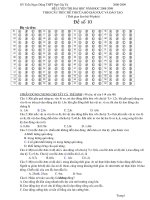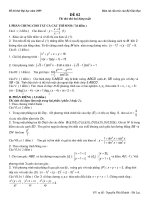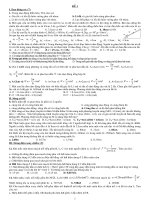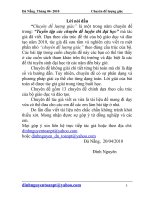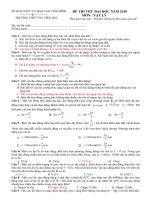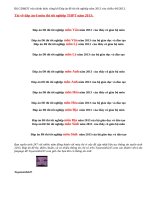(CÓ đáp án) đề MINH họa THEO cấu TRÚC của bộ GIÁO dục số 13
Bạn đang xem bản rút gọn của tài liệu. Xem và tải ngay bản đầy đủ của tài liệu tại đây (144.61 KB, 7 trang )
ĐỀ MINH HỌA SỐ 13
Mark the letter A, B, C or D to indicate the word whose underlined part differs from the other three in
pronunciation in each of the following questions.
1.
A. preferred
B. watched
C. opened
D. enjoyed
2.
A. hike
B. wind
C. child
D. tide
Mark the letter A, B, C or D to indicate the word that differs from the other three in the position of the primary
stress in each of the following questions.
3.
A. promote
B. service
C. arrange
D. decide
4.
A. disappear
B. familiar
C. initiate
D. tsunami
Mark the letter A, B, C or D to indicate the correct answer to each of the following questions.
5. Nobody answered the door, ………………?
A. weren’t they
B. did they
C. were they
D. didn’t they
6. Jimmy’s low examination scores kept him from ……………… to the university.
A. to admit
B. admitting
C. to be admitted
D. being admitted
7. When the old school friends met, a lot of happy memories ……………… back.
A. were being brought
B. were brought
C. had been brought
D. was brought
8.The doctors know that it is very difficult to save the patient’s life; ………………, they will try their best.
A. although
B. but
C. despite
D. however
9. Tourists should avoid purchasing unusual relics ……………… protected heritage sites.
A. illegally removed from
B. removed illegally from
C. illegally removing from
D. being illegally removed from
10. Visiting Ha Long Bay, tourists can save money thanks …………… the availability of low-cost hotels and
cruise tours.
A. for
B. with
C. about
D. to
11. ………………, tell him that I have gone to London.
A. When Mr. Jones calls
B. As does Mr. Jones call
C. Will Mr. Jones call
D. When Mr. Jones will call
12. If she didn’t give us a hand, we ……………… our project tomorrow
A. didn’t finish
B. couldn’t finish
C. couldn’t have finished
D. won’t finish
13. Make sure you ……………… us a visit when you are in town again.
A. give
B. do
C. pay
D. have
14. Mr. Park Hang Seo, a Korean coach, is considered a big ……………… in Vietnam football.
A. cheese
B. bread
C. sandwich
D. egg
15. It can be seen that Urbanization has resulted in ……………… problems besides the benefits.
A. vary
B. various
C. variety
D. variability
16. The residents living in this area were warned not to be extravagant with water ……………… the low rainfall
this year.
A. in view of
B. with a view to
C. regardless of
D. irrespective of
17. The scientists are encountering the difficulties of ……………… of radioactive waste.
A. depleting
B. preserving
C. eliminating
D. disposing
18. In Viet Nam, you shouldn’t ……………… at somebody house on the first day of the New Year unless you
have been invited by the house owner.
A. put up
B. go up
C. show up
D. pick up
Mark the letter A, B, C, or D on your answer sheet to indicate the word(s) CLOSEST in meaning to the
underlined word(s) in each of the following questions.
19. Their daughter soon became a celebrated writer after the publication of her first novel.
A. honored
B. best-seller
C. praised
D. famous
20. While playing hide and seek, the children came across some old photos in the attic.
A. discovered by accident
B. found on purpose
C. took by mistake
D. looked for a reason
Mark the letter A, B, C, or D on your answer sheet to indicate the word(s) OPPOSITE in meaning to the
underlined word(s) in each of the following questions.
21. I was going to have a go at parachuting but lost my nerve at the last minute.
A. was determined to go ahead
B. lost my temper
C. was discouraged from trying
D. began to dislike it
22. It is widely known that the excessive use of pesticides is producing a detrimental effect on the local
groundwater.
A. useless
B. harmless
C. damaging
D. fundamental
Mark the letter A, B, C, or D on your answer sheet to indicate the option that best completes each of the
following exchanges.
23. Tom is apologizing to Peter for being late.
– Tom: “Sorry, I’m late, Peter. My car has broken down on the way here.”
– Peter: “………….…”
A. No, I wouldn’t mind at all.
B. That’s all right.
C. Not on my account.
D. Well, it’s worth a try.
24. Two friends are talking about the coming Christmas holiday
- Tony: “Are you going to your family reunion this Christmas holiday?”
- Mark: “………………”
A. As a matter of fact, I don't mind it at all.
B. I do. I've been excited about it now.
C. However, My parents and I are going to take a trip abroad
D. You bet. All my uncles and aunts will take their children along, too.
Read the following passage and mark the letter A, B, C, or D on your answer sheet to indicate the correct word
or phrase that best fits each of the numbered blanks from 25 to 29.
Mother Teresa was one of the most influential personalities of the twentieth century. However, her life was
neither easy nor glamorous. She was born in Skoje, Macedonia in 1910. When she was 8 years old, her father
died unexpectedly, and the family became devastated after a(an) (25) …………. of intense grief. At the age of 18
she left her home in Skopje and joined the Sisters of Loreto, an Irish community of nuns with missions in India.
She went to India as a (26) …………. She became a teacher of English in a secondary school. The school was in
a nice area but there were slums nearby. Conditions there were absolutely terrible. She was horrified by (27)
…………. she saw. She insisted on leaving her comfortable convent and going to live among the poor. At first her
superiors tried to discourage her from leaving the convent but in the end they agreed to (28) …………. her go.
Soon other people heard about her work and came to help her. (29) …………. she had no money herself, she
succeeded in building shelters for the dying and schools for the poor. By the 1990s, she had become famous and
she was eventually given the Nobel Prize for her service to the poor. Mother Teresa died on September 5th, 1997.
25. A. period
B. event
C. series
D. date
26. A. sister
B. minister
C. priestess
D. missionary
27. A. what
B. where
C. which
D. that
28. A. permit
B. let
C. allow
D. encourage
29. A. Whereas
B. Although
C. Because
D. If
Read the following passage and mark the letter A, B, C, or D on your answer sheet to indicate the correct
answer to each of the questions from 30 to 34.
One way of training for your future occupation in Germany is by pursuing a dual vocational training
programme. Such programmes offer plenty of opportunity for on-the-job training and work experience.
Programmes usually last between two and three and a half years and comprise theoretical as well as practical
elements. You will spend one or two days a week, or several weeks at once, at a vocational school where you will
acquire the theoretical knowledge that you will need in your future occupation. The rest of the time will be spent
at a company. There you get to apply your newly acquired knowledge in practice, for example by learning to
operate machinery. You will get to know what your company does, learn how it operates and find out if you can
see yourself working there after completing your training.
This combination of theory and practice gives you a real head start into your job: by the time you have
completed your training, you will not only have the required technical knowledge, but you will also have handson experience in your job. There are around 350 officially recognised training programmes in Germany, so
chances are good that one of them will suit your interests and talents. You can find out which one that might be by
visiting one of the jobs and vocational training fairs which are organised in many German cities at different times
in the year.
Employment prospects for students who have completed a dual vocational training programme are very
good. This is one of the reasons why this kind of training is very popular with young Germans: around two thirds
of all students leaving school go on to start a vocational training programme.
(Source: http ://www. make-it-in-germany. com)
30. How many German school leavers choose this vocational training programme?
A. around one out of five B. about 70%
C. less than a third
D. well over 75%
31. The word “it” in the first paragraph refers to ……………….
A. organisation
B. machinery
C. knowledge
D. company
32. Which of the following statements best describes the dual vocational training programmes?
A. These programmes provide you with both theoretical knowledge and practical working experience.
B. These programmes consist of an intensive theoretical course of two and a half years at a vocational
school.
C. These programmes require you to have only practical working time at a certain company.
D. These programmes offer you some necessary technical skills to do your future job.
33. The word “hands-on” in the second paragraph is closest in meaning to ……………….
A. practical
B. technical
C. theoretical
D. integral
34. Which of the following is probably the best title of the passage?
A. Employment Opportunities and Prospects in Germany
B. Dual Vocational Training System in Germany
C. Combination of Theory and Practice in Studying in Germany
D. Higher Education System in Germany
Read the following passage and mark the letter A, B, C, or D on your answer sheet to indicate the correct
answer to each of the questions from 35 to 42
Scientists have identified two ways in which species disappear. The first is through ordinary or
“background” extinctions, where species that fail to adapt are slowly replaced by more adaptable life forms. The
second is when large numbers of species go to the wall in relatively short periods of biological time. There have
been five such extinctions, each provoked by cataclysmic evolutionary events caused by some geological
eruption, climate shift, or space junk slamming into the Earth. Scientists now believe that another mass extinction
of species is currently under way – and this time human fingerprints are on the trigger.
How are we are doing it? Simply by demanding more and more space for ourselves. In our assault on the
ecosystems around us we have used a number of tools, from spear and gun to bulldozer and chainsaw. Certain
especially rich ecosystems have proved the most vulnerable. In Hawaii more than half of the native birds are now
gone – some 50 species. Such carnage has taken place all across the island communities of the Pacific and Indian
oceans. While many species were hunted to extinction, others simply succumbed to the “introduced predators’
that humans brought with them: the cat, the dog, the pig, and the rat.
Today the tempo of extinction is picking up speed. Hunting is no longer the major culprit, although rare
birds and animals continue to be butchered for their skin, feathers, tusks, and internal organs, or taken as savage
pets. Today the main threat comes from the destruction of the habitat of wild plants, animals, and insects need to
survive. The draining and damming of wetland and river courses threatens the aquatic food chain and our own
seafood industry. Overfishing and the destruction of fragile coral reefs destroy ocean biodiversity. Deforestation
is taking a staggering toll, particularly in the tropics where the most global biodiversity is at risk. The shinking
rainforest cover of the Congo and Amazon river basins and such place as Borneo and Madagascar have a wealth
of species per hectare existing nowhere else. As those precious hectares are drowned or turned into arid pasture
and cropland, such species disappear forever.
Source: Final Countdown Practice Tests by D.F Piniaris, Heinle Cengage Learning, 2010
35. What does the passage mainly discuss?
A. Human activity and its impact on a mass extinction of species
B. The two ways in which species disappear
C. The tempo of extinction of species today
D. Deforestation as a major cause of mass extinctions of species
36. The word assault in paragraph 2 is closest in meaning to ………………
A. development
B. attack
C. effort
D. influence
37. All of the following are mentioned as a form of habitat destruction EXCEPT ………………
A. destroying coral reefs
B. cutting down forests
C. damming wetlands and rivers
D. hunting rare birds and animals
38. What was the main threat to biodiversity in Hawaii and other islands in the Pacific and Indian oceans until
recently?
A. tools used by human beings
B. human assault on ecosystems
C. vulnerable rich ecosystems
D. hunters and introduced predators
39. The word them in paragraph 2 refers to ………………
A. species
B. oceans
C. humans
D. predators
40. Which is no longer considered a major cause of the mass extinction under way currently?
A. the killing of animals for their body parts
B. the destruction of habitats of species
C. the shrinking of rainforests in the tropics
D. the building of dams across rivers
41. The word butchered in paragraph 3 is closest in meaning to ………………
A. raised
B. traded
C. cooked
D. killed
42. It can be inferred from the passage that ………………
A. the current mass extinction is different from the other five in that it is caused by humans
B. hunting is the major contributing factor that speeds up the extinction of species
C. habitat destruction makes a minor contribution to the current mass extinction of species
D. it’s impossible for scientists to identify the causes of mass extinctions of species
Mark the letter A, B, C, or D on your answer sheet to indicate the underlined part that needs correction in
each of the following questions.
43. For more than 450 years, Mexico City has been the economic, culture and political centre of Mexican people.
A. more than
B. culture
C. has been
D. Mexican people
44. Almost medical doctors have had some training in psychology and psychiatry.
A. Almost
B. have had
C. training
D. and
45. Fifty minutes are the maximum length of time allotted for the exam.
A. length
B. for
C. are
D. allotted
Mark the letter A, B, C, or D on your answer sheet to indicate the sentence that is closest in meaning to each
of the following questions.
46. The living room isn’t as large as the kitchen.
A. The living room is larger than the kitchen.
B. The kitchen is smaller than the living room.
C. The kitchen is larger than the living room.
D. The kitchen is not smaller than the living room.
47. ‘No, no, you really must stay a bit longer!’ said the boys.
A. The boys denied my staying a bit longer
B. The boys refused to let me stay a bit longer.
C. The boys didn't agree to let stay a bit longer.
D. The boys insisted on my staying a bit longer.
48. It was a mistake of Tony to buy that house.
A. Tony couldn’t have bought that house.
B. Tony can’t have bought that house.
C. Tony needn’t have bought that house.
D. Tony shouldn’t have bought that house.
Mark the letter A, B, C, or D on your answer sheet to indicate the sentence that best combines each pair of
sentences in the following questions
49. The noisy party next door stopped after midnight
A. The noisy party next door did not stop until midnight
B. It was not until midnight the noisy party next door stopped
C. Not until after midnight did the noisy party next door stop
D. It was until after midnight that the noisy party next door stopped
50. He didn’t take his father’s advice. That’s why he is out of work now
A. If he had taken his father’s advice, he would not have been out of work now.
B. If he took his father’s advice, he would not be out of work now.
C. If he had taken his father’s advice, he would not be out of work now.
D. If he hadn’t taken his father’s advice, he would have been out of work now.
1. B
11. A
21. A
31. D
41. D
2. B
12. B
22. B
32. A
42. A
3. B
13. C
23. B
33. A
43. B
4. A
14. A
24. D
34. B
44. A
ĐÁP ÁN
5. B
6. D
15. B
16. A
25. A
26. D
35. B
36. B
45. C
46. C
7. B
17. D
27. A
37. D
47. D
8. D
18. C
28. B
38. D
48. D
9. A
19 D
29 B
39 C
49 C
10. D
20. A
30. B
40. A
50. C
ĐÁP ÁN CHI TIẾT
1
Đáp
Án
B
2
B
3
B
4
A
5
B
6
D
7
B
8
D
9
A
10
D
11
A
12
13
14
B
C
A
15
B
16
A
17
D
18
C
19
20
D
A
21
A
Câu
Giải thích
A. preferred /pri'fз:d/ B. watched /wɒtʃt/
C. opened / əʊpənd/ D. enjoyed /ɪn'dʒɔɪd/
A. hike /haɪk/
B. wind / /wɪnd/
C. /tʃaɪld/
D. tide / taɪd/
Chọn B. âm /i/ các phương án còn lại /ai/
A. promote /prə'məʊt/
B. service/ˈsɜː.vɪs/
C. recruit /rı'kru:t/
D. decide /dɪˈsaɪd/
A. disappear /ˌdɪs.əˈpɪər/ B. familiar /fəˈmɪl.i.ər/
C. initiate /ɪˈnɪʃ.i.eɪt/
D.tsunami /tsuːˈnɑː.mi/
Đáp án A trọng âm rơi vào âm tiết thứ ba, cịn lại là âm thứ hai
Nobody: khơng ai cả => mang nghĩa phủ định
Vế trước dạng phủ định => câu hỏi đi dạng khẳng định
answered: động từ chia ở thì quá khứ đơn => dùng trợ động từ “did” ở câu hỏi đuôi
Sau giới từ dùng danh động từ
Jimmy được nhận vào học nên dùng danh động từ bị động ( being Ved-3)
Chia thì quá khứ đơn cho chuỗi sự kiện liên tiếp nhau , chủ từ số nhiều chọn “were”
, but ( conj) ở đầu câu
; however, ( adv) : Dùng đấu câu,giữa, hoặc cuối câu / dùng với dấu phẩy và chấm phẩy
Thay vì dùng mệnh đề quan hệ sau danh từ để xác định hoặc giải thích thêm về danh tù dùng cụm
phân từ thay thế Ving mang ý chủ động , Ved-3 ý bị động
Thanks for st : Cảm ơn ai về điều gì
Thanks to sb/st : nhờ vào ai, cái gì
Trong mệnh đề trạng ngữ chỉ thời gian khơng dùng đảo ngữ, khơng chia thì tương lai , thay thì
tương lai đơn bằng thì hiện tại đơn
Mệnh đề if cho sẵn thì quá khứ đơn nên chọn wouldn’t/ couldn’t + Vo ở mệnhđề chính
Pay a visit ( to sb) : Viếng thăm ai
A big cheese : Nhân vật quan trọng, có tầm ảnh hưởng trong một tổ chứ
Vary /ˈveə.ri/ (v): làm cho biến đổi, làm cho khác nhau
Various /ˈveə.ri.əs/ (a): đa dạng, khác nhau
Variety /vəˈraɪ.ə.ti/ (n): sự đa dạng
Variability /ˌveə.ri.əˈbɪl.ə.ti/ (n): sự có thể thay đổi, tính hay thay đổi
Trước danh từ ‘problems’ cần một tính từ bổ nghĩa
in view of: xem xét, cân nhắc điều gì
with a view to: để làm gì
regardless of: bất kể, không phân biệt
irrespective of: không phân biệt, không kể,bất
chấp
A. depleting : Làm cạn kiệt
B. preserving : Giữ gìn , bảo quản
C. eliminating : Loại bỏ
D. disposing of : xử lý, giải quyết, vứt bỏ
A. put up: đưa lên
B. go up: tăng lên
C. show up: đến, xuất hiện
D. pick up: chọn, hiểu, nhặt lên
Celebrated(a) : Nổi tiếng = famous
came across = discovered by accident: tình cờ thấy, gặp
lost my nerve: mất tinh thần, chùn bước trái nghĩa
>< was determined to go ahead: quyết tâm tiếp tục làm điều gì
22
B
23
B
24
D
25
A
26
D
27
A
28
B
29
B
30
B
31
D
32
A
33
A
34
B
35
36
B
B
37
D
38
D
detrimental (adj): có hại >< harmless (adj): vơ hại
Đáp lại lời xin lỗi dùng các thành ngữ “không sao đâu”
(Don’t worry about it , that’s all right , that’s OK , no problem , ….)
A.Thật ra thì tơi khơng bận tâm điều đó.
B.Vâng. Tơi đã rất hào hứng với điều đó bây giờ. ( Hỏi Are you..? trả lời I do là không phù hợp)
C.Tuy nhiên, bố mẹ tôi và tơi sẽ có một chuyến đi nước ngồi
D.Tất nhiên rồi. Tất cả các chú và dì của tơi cũng sẽ đưa con đi cùng.
A. period (n) : khoảng thời gian
B. event (n) : sự kiện
C. series (n) : chuỗi loạt
D. date (n) : ngày tháng
A. Sister (n): Chị, em gái, y tá, nữ tu sĩ
B. Minister (n): Mục sư, bộ trưởng
C. Priestess (n): Nữ tu sĩ
D. Missionary (n): Nhà truyền giáo
That + clause / WH +clause
By what she saw..: Bởi những gì bà nhìn thấy
Allow, permit, encourage + Obj + to infinitive
Make, let, see, hear, watch, listen… + Obj + bare infinitive
Thông tin: This is one of the reasons why this kind of training is very popular with young
Germans: around two thirds of all students leaving school go on to start a vocational training
programme.
(Đây là một trong những lý do tại sao loại hình đào tạo này rất phổ biến với giới trẻ Đức: khoảng
hai phần ba học sinh rời trường tiếp tục bắt đầu một chương trình đào tạo nghề.)
You will get to know what your company does, learn how it operates and find out if you can see
yourself working there after completing your training.
Thông tin: This combination of theory and practice gives you a real head start into your job: by the
time you have completed your training, you will not only have the required technical knowledge,
but you will also have hands-on experience in your job.
(Sự kết hợp giữa lý thuyết và thực hành này mang đến cho bạn một khởi đầu thực sự trong công
việc của bạn: khi bạn hồn thành khóa đào tạo, bạn sẽ khơng chỉ có kiến thức kỹ thuật cần thiết
mà cịn có kinh nghiệm thực hành trong công việc)
practical (adj): thực hành = hands-on (adj): thực hành , thực tiễn
Tiêu đề nào sau đâu là tiêu đề phù hợp cho bài đọc?
A. Cơ hội việc làm và triển vọng tại Đức
B. Hệ thống đào tạo nghề kép ở Đức
C. Kết hợp lý thuyết và thực hành học tập tại Đức
D. Hệ thống giáo dục đại học ở Đức
Dựa vào câu chủ đề: “One way of training for your future occupation in Germany is by pursuing a
dual vocational training programme. “ và câu kết “Employment prospects for students who have
completed a dual vocational training programme are very good.”
Thông tin câu chủ đề : Scientists have identified two ways in which species disappear.
assault (n): sự tấn cơng, cơng kích
Tất cả những điều sau đây được đề cập đến như một hình thức hủy hoại mơi trường sống NGOẠI
TRỪ .
A. việc phá hủy các rạn san hô
B. việc chặt phá rừng
C. xây đập ở đầm lầy và sơng ngịi
D. săn bắn các lồi chim và động vật quý hiếm
Today the main threat comes from the destruction of the habitat of wild plants, animals, and
insects need to survive. The draining and damming of wetland and river courses threatens the
aquatic food chain and our own seafood industry. Overfishing and the destruction of fragile coral
reefs destroy ocean biodiversity. Deforestation is taking a staggering toll, particularly in the
tropics where the most global biodiversity is at risk.
Mối đe dọa chính đối với đa dạng sinh học ở Hawaii và các đảo khác ở Thái Bình Dương và Ấn
39
C
40
A
41
D
42
A
43
B
44
A
45
C
46
C
47
D
48
D
49
C
50
C
Độ Dương cho đến gần đây là gì?
A. những cơng cụ được con người sử dụng
B. cuộc tấn công của loài người vào hệ sinh thái
C. hệ sinh thái phong phú dễ bị tổn thương
D. thợ săn và kẻ săn mồi được du nhập
Thông tin: In Hawaii more than half of the native birds are now gone – some 50 species. Such
carnage has taken place all across the island communities of the Pacific and Indian
oceans. While many species were hunted to extinction, others simply succumbed to the
“introduced predators’ that humans brought with them: the cat, the dog, the pig, and the
rat.
Thông tin: While many species were hunted to extinction, others simply succumbed to the
“introduced predators” that humans brought with them: the cat, the dog, the pig, and the rat.
Cái nào khơng cịn được coi là ngun nhân chính của sự tuyệt chủng hàng loạt đang diễn ra?
A. việc giết hại động vật để lấy các bộ phận cơ thể của chúng
B. sự phá hủy mơi trường sống của các lồi
C. sự thu hẹp lại của các rừng mưa nhiệt đới ở vùng nhiệt đới
D. việc xây dựng các con đập qua sông
Thông tin: Hunting is no longer the major culprit, although rare birds and animals continue to be
butchered for their skin, feathers, tusks, and internal organs, or taken as savage pets.
butchered: bị giết = killed
Thông tin: There have been five such extinctions, each provoked by cataclysmic evolutionary
events caused by some geological eruption, climate shift, or space junk slamming into the
Earth. Scientists now believe that another mass extinction of species is currently under way –
and this time human fingerprints are on the trigger.
=> chọn A
economic (adj), political (adj)
nên culture(n) → cultural(adj)
Almost (adverb) : Gần như, hầu như không bổ nghĩa danh từ
Thay bằng từ số lượng Most + danh từ (phần lớn, hầu hết, đa số)
Almost → Most
Cum từ số nhiều chỉ trọng lượng , khoảng cách , số tiền … chia động từ số ít
are → is
‘No, no, you really must stay …” diễn tả sự nhất quyết, khăng khăng Thuật lại bằng từ” insist “ là
phù hợp nghĩa
A. Các chàng trai từ chối tôi ở lại lâu hơn một chút
B. Các chàng trai từ chối để tôi ở lại lâu hơn một chút.
C. Các chàng trai không đồng ý để ở lại lâu hơn một chút.
D. Các chàng trai khăng khăng tôi ở lại lâu hơn một chút.
couldn’t have Ved-3 : đã khơng thể làm gì
can’t have Ved-3: Chắc đã khơng làm gì
needn’t have Ved-3: Đã khơng cần
shouldn’t have Ved-3: Lẽ ra đã khơng nên làm gì
It was not until….that subj+ Ved-2………. = Mãi đến khi nào ai mới làm gì / chuyện gì xảy ra
Not until …….… did subj+Vo… ( Đảo ngữ)
Câu điều kiện hỗn hợp ( If 3+2): If+ S + had +Ved-3…… , S + would + Vo……….
didn’t take : thì quá khứ đơn=> If 3
is out of work : thì hiện tại đơn=>Dùng như If 2 trong mệnh đề chính
